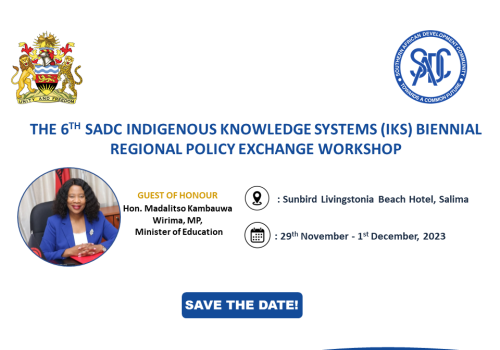The Government of Malawi is pleased to announce the hosting of the 6th Southern African Development Community (SADC) Regional Policy Workshop on Indigenous Knowledge Systems (IKS), scheduled to take place from November 29 to December 1, 2023, at the Sunbird Livingstonia Beach Hotel in Salima. This landmark regional event will unfold under the theme, “Leveraging Indigenous Knowledge Systems in the Agro-processing and Pharmaceutical Value Chains for Industrial Development”.
Initiated by the SADC Secretariat in 2004, these biennial workshops serve as a platform for policy exchange and expert discussions on Indigenous Knowledge Systems (IKS). In its simplest form, IKS encompasses the unique, traditional and locally developed knowledge that indigenous communities pass down through generations. This knowledge, deeply rooted in cultural heritage, plays a vital role in shaping sustainable practices and community resilience, covering areas such as environment, natural resources, agriculture and health.
Building on the success of the previous workshops, it was unanimously decided at the fifth policy workshop in Botswana that Malawi would host the sixth edition. Aligned with the SADC Protocol on Science, Technology and Innovation of 2008, which underscores the importance of developing, valuing and promoting IKS and technologies,this workshop plays a crucial role in promoting dialogue and knowledge sharing regarding the development and implementation of national IKS policies by SADC Member States.
The workshop provides a platform for experts drawn from diverse fields to engage in panel discussions focusing on various IKS policy issues,such as funding mechanisms, intellectual property protection of indigenous knowledge, indigenous knowledge research and commercialisation, culture and heritage.
Objectives of the 6th Regional Policy Workshop on IKS
Creating awareness: To disseminate and publicise SADC Policy tools and instruments in order to raise awareness about the opportunities and benefits of investing in IKS in the region.
Policy development: To expedite the development of national IKS policies, share progress and address challenges encountered by SADC Member States in developing and implementing the national IKS policies.
Implementation strategies: To develop strategies for implementing approved SADC policy tools, including the Resource Mobilisation Toolkit, Research Ethics Guidelines, IKS Policy Guidelines and Action Plan, and Guidelines on the Operationalisation of the Nagoya Protocol on Access and Benefit Sharing in the SADC Region.
Harmonisation: To harmonise the Regional Guidelines on the Operationalisation of the Nagoya Protocol on Access and Benefit Sharing with the African Union Guidelines, thus ensuring coordinated implementation across Africa.
Regional strategy: To consider the draft Regional Strategy on IKS and the Awareness and Advocacy Programme of Action.
Showcasing innovations: To showcase IKS products, services, innovations, technologies and knowledge from within the SADC region.
Infrastructure development: To map a regional strategy for investing in research and innovation infrastructure in order to scale up support for IKS within SADC Member States.
Participants
The workshop will bring together an array of stakeholders, including government representatives from SADC Member States, academia, independent researchers and research organizations, international agencies, indigenous knowledge holders, schools, small and medium-sized enterprises (SMEs), private sector entities (tourism, museums, cosmetics, food and pharmaceuticals), regional and continental institutions, and the media.
Outcomes
The workshop aims to produce an updated status on the progress of national IKS Policy development by SADC Member States and foster collaboration among stakeholders for the advancement of Indigenous Knowledge Systems in the region and on the African continent.
| Attachment | Size |
|---|---|
| Comunicado de Imprensa.pdf | 80.72 KB |
| PRESS RELEASE - THE 6TH SADC INDIGENOUS KNOWLEDGE SYSTEMS - ENGLISH.pdf | 165.96 KB |
| Communiqué de Presse.pdf | 200.52 KB |

